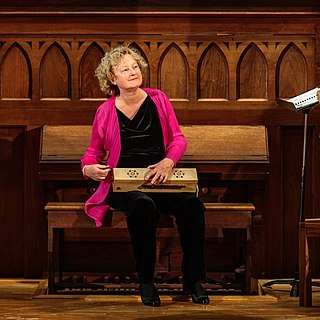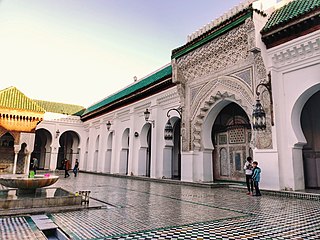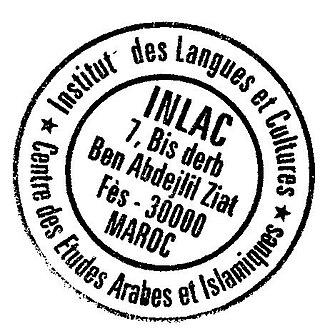Arabic music is the music of the Arab world with all its diverse music styles and genres. Arabic countries have many rich and varied styles of music and also many linguistic dialects, with each country and region having their own traditional music.

The fez, also called tarboosh/tarboush, is a felt headdress in the shape of a short, cylindrical, peakless hat, usually red, typically with a black tassel attached to the top. The name "fez" may refer to the Moroccan city of Fez, where the dye to color the hat was extracted from crimson berries. However, its origins are disputed.

Salamone Rossi or Salomone Rossi was an Italian Jewish violinist and composer. He was a transitional figure between the late Italian Renaissance period and early Baroque.

Tétouan, is a city in northern Morocco. It lies along the Martil Valley and is one of the two major ports of Morocco on the Mediterranean Sea, a few miles south of the Strait of Gibraltar, and about 60 kilometres (37 mi) E.S.E. of Tangier. In the 2014 Moroccan census, the city recorded a population of 380,787 inhabitants. It is part of the administrative division Tanger-Tetouan-Al Hoceima.
Sephardic music is an umbrella term used to refer to the music of the Sephardic Jewish community. Sephardic Jews have a diverse repertoire the origins of which center primarily around the Mediterranean basin. In the secular tradition, material is usually sung in dialects of Judeo-Spanish, though other languages including Hebrew, Turkish, Greek, and other local languages of the Sephardic diaspora are widely used. Sephardim maintain geographically unique liturgical and para-liturgical traditions.

A mellah is the place of residence historically assigned to Jewish communities in Morocco.
Andalusī nūbah, also transliterated nūba, nūbā, or nouba, or in its classical Arabic form, nawba, nawbah, or nōbah, is a music genre found in the North African Maghrib states of Morocco, Algeria, Tunisia, and Libya but, as the name indicates, it has its origins in Andalusi music. The name replaced the older use of sawt and originated from the musician waiting behind a curtain to be told it was his turn or nawbah by the sattar or curtain man.

Moroccan Jews constitute an ancient community. Before the founding of the State of Israel in 1948, there were about 265,000 Jews in the country, which gave Morocco the largest Jewish community in the Muslim world, but by 2017 only 2,000 or so remained. Jews in Morocco, originally speakers of Berber languages, Judeo-Moroccan Arabic or Judaeo-Spanish, were the first in the country to adopt the French language in the mid-19th century, and unlike the Muslim population French remains the main language of members of the Jewish community there.
Joel Cohen is an American musician specializing in early music repertoires. Cohen graduated from Classical High School in Providence, Rhode Island in 1959, and Brown University in 1963. He continued graduate education at Harvard University. From 1968 to 2008, he was the director of the Boston Camerata, a prominent American early music ensemble. He remains connected to the Boston Camerata as Music Director Emeritus. Cohen founded the Camerata Mediterranea in 1990 and incorporated it as a nonprofit research institute in France in 2007. He plays the lute and guitar, as well as sings. He is best known as an organizer and creator of concert programs and sound recordings. He has also written extensively on musical topics. In recent years, Cohen's research and performance activities have centered on early American repertoires, as well as Southern European repertoires of the Middle Ages. Many of his projects in this latter category involve collaboration with Middle Eastern musicians.

Anne Azéma is a French-born soprano, scholar, and stage director. She is currently artistic director of the Boston Camerata. She has been an important or leading singer of early music since 1993. She has created and directed programs for the Boston Camerata and is also noted as a music scholar. She is perhaps best known for performing music from the Middle Ages, lute songs from the Renaissance period, Baroque sacred music, Shaker song, and contemporary music theater. She is also a music educator and a researcher. She has performed in Japan, Germany, the US, Australia and elsewhere.
The Song of the Sibyl is a liturgical drama and a Gregorian chant, the lyrics of which comprise a prophecy describing the Apocalypse, which has been performed in churches on Majorca and Alghero, and some Catalan churches, in the Catalan language on Christmas Eve nearly uninterruptedly since medieval times. It was declared a Masterpiece of the Oral and Intangible Heritage of Humanity by UNESCO on 16 November 2010.

Françoise Atlan is a French singer and ethnomusicologist, born in a Sephardic Jewish family in Narbonne, France on 27 July 1964. Her father was a lawyer and native of Béjaïa, Algeria, and her mother was a pianist and a lyrical singer.
The Play of Daniel, or Ludus Danielis, is either of two medieval Latin liturgical dramas based on the biblical Book of Daniel, one of which is accompanied by monophonic music.
The Harvard University Choir, more commonly referred to as the University Choir or simply UChoir, is Harvard University's oldest choir. It has provided choral music for the Harvard Memorial Church and its predecessor church for over 180 years, and is Harvard's only professional choir. Each year, a select group of choristers also make up the Harvard Choral Fellows, who sing at the church's daily Morning Prayers service in Appleton Chapel.
Karim Nagi is an Egyptian musician, composer, ethnic dance artist, and DJ. He specializes in traditional Arabic music but is widely known for his innovative approach. In total he has released fourteen CDs and six DVDs, and he tours internationally performing and teaching.
The Boston Camerata is an early music ensemble based in Boston, Massachusetts. It was founded in 1954 by Narcissa Williamson, at the Museum of Fine Arts, Boston, as an adjunct to that museum's musical instrument collection.

Fez or Fes is a city in northern inland Morocco and the capital of the Fès-Meknès administrative region. It is the second largest city in Morocco, with a population of 1.11 million, according to the 2014 census. Located to the northwest of the Atlas Mountains, it is surrounded by hills and the old city is centered around the Fez River flowing from west to east. Fez has been called the "Mecca of the West" and the "Athens of Africa". It is also considered the spiritual and cultural capital of Morocco.

The International Institute for Languages and Cultures, Fès, Morocco (INLAC) is a private institute for teaching and learning Arabic, located in the old city (medina) of Fez. It offers undergraduate and graduate credit programs.

Joseph (Yossi)Chetrit is Emeritus Professor of the French language and literature department and the Hebrew language department at the University of Haifa, former head of the Centre for the Study of Jewish Culture in Spain and Muslim Countries, and founder of the Tsfon-Maarav Troupe.
Judith Rita Cohen is a Canadian ethnomusicologist, music educator, and performer. Her research interests include Judeo-Spanish (Ladino) songs; medieval and traditional music from the Balkans, Portugal, French Canada, and Yiddish; pan-European balladry; and songs from Crypto-Jewish regions in Portugal. She has received numerous research and travel grants to do fieldwork in Spain, Portugal, Morocco, Israel, Turkey, Greece, France, Belgium, Canada, and the United States, and has published many journal articles, papers, and book chapters. She plays a variety of medieval musical instruments, and sings and performs as part of her lectures and in concerts and solo recitals. She is also the editor of the Alan Lomax Spanish collection maintained by the Association for Cultural Equity.









